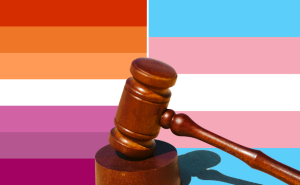21 March, 2024 – National LGBTIQ+ group Equality Australia and women’s groups are calling on the Federal Government to adopt the recommendations of the Australian Law Reform Commission’s anti-discrimination inquiry.
The ALRC report, tabled in parliament on Thursday, covers religious exemptions for educational institutions under federal anti-discrimination and employment laws.
Justice Stephen Rothman made 11 recommendations, including the blanket removal of section 38 of the Sex Discrimination Act which allows religious educational institutions to discriminate against students and staff based on their sex, sexual orientation, gender identity, marital or relationship status, or pregnancy.
“This is the blueprint for reform and we call on the federal government to adopt the recommendations in full, and pass legislation as soon as possible,” said Equality Australia Legal Director Ghassan Kassisieh.
“Labor committed to these reforms before coming to power but discrimination against LGBTQ+ students and staff is happening in religious schools across the country because of gaps in Australian laws that makes it lawful.
“The time has come for our laws to be consistent with Australia’s international human rights obligations and reflect who we are as a nation in the 21st century.”
Equality Australia CEO Anna Brown said the LGBTIQ+ community had spent more than a decade raising this issue.
“The ALRC has carefully evaluated the law and options for reform, and considered a vast number of submissions and has produced balanced and sensible recommendations to guide reform,” she said.
“Every day we delay these reforms there will be more students who are robbed of their chance to become a school prefect or take their partner to the formal, and there will be more teachers who are fired or told they are no longer fit for any promotions.
“While they will never get back these opportunities the government can act now to protect future generations from harm.”
Olympian Ian Thorpe AM:
“If the Prime Minister and Government want to make good on their election promise to us, they can act on the recommendations in this report right now to end discrimination against students and staff in religious schools.
“Not acting will be a blow to our community and to all the people waiting for better protections including women, people who are divorced or in de facto relationships, and people of faith. “
Helen Daly Fisher, Convenor of the Equality Rights Alliance said:
“Human rights are the way we make sure the world we live in is fair for everyone.
We call on parliament to work together to pass a bill which protects women and girls to make Australia a fairer place and to fulfill the promises we’ve made to the world.
“We also call on the federal government to ensure the bill doesn’t license discrimination against women, girls and others who are marginalised because of their sexuality or gender identity.”
Renee Carr, Executive Director of Fair Agenda said:
“The drafting of the Sex Discrimination Act in the 1980s was a pivotal achievement for the women’s movement. Among other things, it played a key role in levelling the playing field for women and banned sexual harassment for the first time.
“In 2024 it needs to be updated to reflect present day Australia. All women, including pregnant women and women of different marital status must be protected from discrimination wherever they work or study.”
Key recommendations:
The ALRC has made 11 recommendations for protecting staff and students from discrimination. It has recommended allowing religious schools to preference employing staff of their own faith where it is reasonably necessary and proportionate to the aim of building a community of faith and does not amount to discrimination under the Sex Discrimination Act.
The key recommendations are:
- Protecting staff and students: To prohibit religious educational institutions from discriminating against students and staff based on their sexual orientation, gender identity, sex, marital or relationship status or pregnancy, the ALRC has recommended simply repealing section 38 of the Sex Discrimination Act and ensuring religious educational institutions cannot rely on sections 23 and 37.
- Protecting loved ones: The ALRC has recommended protecting ‘personal associates’ from discrimination under the Sex Discrimination Act, in a similar way to the Racial Discrimination Act and Disability Discrimination Act. For example, this would protect from discrimination the children of LGBTQ+ parents, divorced parents or de facto couples, who were discriminated against because their parents were LGBTQ+, divorced or unmarried.
- Maintaining religious preferencing in employment where reasonable: The ALRC has recommendedallowing religious schools to preference people of their own faith when selecting staff, provided it is reasonably necessary and proportionate to the aim of building and maintaining a community of faith and does not amount to discrimination under the Sex Discrimination Act 1984.
- Tidying up the Fair Work Act: The ALRC has recommended changes to the Fair Work Act that mirror the recommendations above.
Background:
Section 38 of the Sex Discrimination Act 1984 (Cth) allows religious educational institutions to discriminate against students and staff based on their sex, sexual orientation, gender identity, marital or relationship status, or pregnancy. Section 37 provides further exemptions to religious bodies generally, while section 23 allows discrimination by religious bodies in accommodation.
Religious organisations also have exemptions in the Fair Work Act 2009 (Cth) allowing discrimination in employment on a number of grounds.
In the lead up to the federal election, the Albanese Government committed to reforming anti-discrimination laws so that religious educational institutions:
- could no longer discriminate against students and staff based on their sexual orientation, gender identity, marital or relationship status or pregnancy, and also for staff, based on their sex;
- could continue to preference, in good faith, persons of the same religion when selecting staff.
- In November 2022, the Australian Law Reform Commission (headed by NSW Supreme Court Justice Stephen Rothman as Commissioner) was tasked with recommending a pathway for implementing the Australian Government’s commitment.
Media Contact: Tara Ravens 0408 898 154, [email protected], Emily Mulligan, [email protected], 0411 207 633



